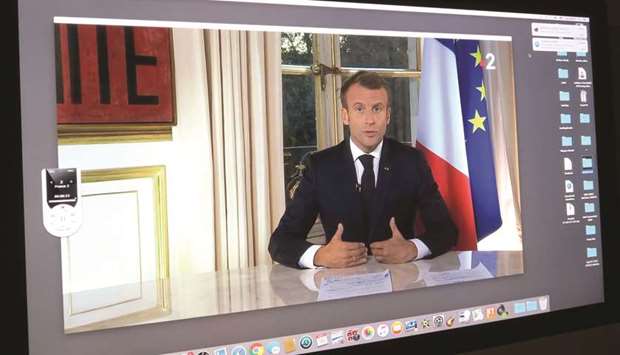Two weeks after political veteran Gerard Collomb abruptly resigned as interior minister, Macron appointed the ultra-loyal head of his Republic on the Move party, Christophe Castaner, to replace him.
The centrist president also dismissed his agriculture and culture ministers, seen as weak links in his cabinet, which is a blend of experts in their field and experienced politicians from the left and right.
The prime minister, foreign and economy ministers all kept their jobs, however.
Presenting a “renewed, dynamic team with a second wind”, the presidency said it would continue on the same track of reforms.
“We will not change direction,” Prime Minister Edouard Philippe vowed.
But analysts expressed doubt that the reshuffle would significantly change perceptions of the government.
“It’s a very technical reshuffle ... which means it is unlikely to stir French passions,” said Chloe Morin, an analyst at Ipsos polling company.
Collomb’s departure on October 2 was a blow to Macron, coinciding with a slump in his popularity after a scandal involving a close aide, several verbal gaffes and a raft of disappointing economic data.
Collomb’s resignation followed that of star environment minister Nicolas Hulot in August, creating a sense of a government in disarray.
Macron’s delay in carrying out the reshuffle, caused partly by his difficulty in convincing people to join his team, was seen as further evidence of his weakened position.
Yesterday the opposition slammed his hotly anticipated new picks as underwhelming.
The parliamentary leader of the centre-right Republicans, Christian Jacob, said it was “more like a balloon bursting than a second wind”.
Christophe Castaner, a gregarious 52-year-old former Socialist from southern France, had been widely tipped to replace Collomb, who is returning to his home town of Lyon to serve as mayor.
A member of the president’s inner circle, Castaner was a rebellious youth who has spoken of how he rubbed shoulders with Marseille gang members at poker games before entering politics, first as a mayor than an MP.
He has little experience of national security issues but vowed yesterday to be “at your service, ladies and gentlemen, 24 hours a day”.
Castaner resigned his leadership of the ruling party to take up the job.
The current head of France’s domestic intelligence agency, Laurent Nunez, was named as his deputy at the interior ministry.
Macron’s choices reflected his continuing attempt to appeal to both sides of the political divide, but there were few household names in the new line-up.
Didier Guillaume, a former Socialist, was named agriculture minister, replacing Stephane Travert, while centre-right former Republicans lawmaker Franck Riester took over from publisher Francoise Nyssen in culture.
There were also changes in the ministry for relations with local government, with Jacqueline Gourault taking over the tricky portfolio at a time of budget cuts that have caused deep discontent among rural mayors.
Analysts say many ministers and members of Macron’s party have struggled to emerge from his shadow since he won elections in May 2017 at the head of a newly formed pro-EU, pro-business party.
His polling numbers have slumped to their lowest level since his electoral victory in 2017.
Surveys show that only around 30% of French voters have a positive view of his presidency.
He suffered the first major scandal of his presidency in July when footage emerged of one of his most trusted security aides hitting a protester while apparently posing as a policeman at a May Day rally.
Slowing economic growth – expected to fall to 1.6% this year from 2.3% in 2017 – and a series of public gaffes that fueled a perception of arrogance have also served to undermine Macron’s popularity.

